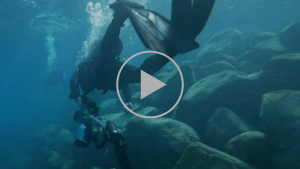Today, more than ever, we understand that the health of our oceans and our health as a species are at risk. From the impact of climate change on the oceans to the planet’s ever-increasing population, it’s undeniable that we need to rapidly transform our food production systems.
The plant-based movement leads us to believe that this particular way of diet uses far fewer natural resources and has a far smaller impact on the environment, and is therefore the right way for us to feed the world. What these movements fail to recognize is the complex and regenerative nature of how our oceans operate and the critical role small-scale fisheries play in feeding millions of people around the world while protecting the natural resources from which they come.
You’ve seen the footage and heard the stories; humans have developed increasingly efficient but also destructive methods of food production, including fisheries. Food production systems ignore local (often indigenous) livelihoods, exacerbating the environmental and climate crises we face. When it comes to tuna, the truth is that understanding the fishing methods and gear used to catch tuna has a huge impact on the sustainability of the fishery. How and where tuna is caught are important indicators of the level of responsible sourcing.
We all know that the industrial tuna industry needs to transform into a responsible system that lives in harmony with nature and gives back to the ocean and the people who depend on it. Tuna fishers are no exception, but on this World Fisheries Day, here are some wild catches: Sustainable tuna fishing does exist.

My name is Stuart, that’s me.
Artisanal fishing methods date back to the time when people began to make a living from the sea. In local coastal communities around the world, hundreds of small-scale fishing operations rely on tuna fishing just as much as their ancestors did. Many still use the same bamboo material for their fishing rods. This ancient connection means that in many areas tuna fishing is an integral part of local culture and values, and a way of life. These fisheries operate on a smaller scale and currently have smaller markets, but produce responsibly fished and sustainable tuna for the world.
They practise what is called “one-by-one fishing”, a technique that uses one hook and one line to catch one tuna at a time. This method has a variety of environmental, social, and economic benefits; it allows tuna species to thrive, it diminishes the bycatch of other marine species, helps to preserve biodiversity, and minimises the amount of plastic pollution. One-by-one fisheries are responsible for income and a circular wealth movement among coastal communities that rely on the fishing industry for their livelihoods. This promotes local food security, poverty reduction, and secures livelihoods.
You can find these types of fisheries all over the world; from the beautiful islands of the Azores in the subtropical North Atlantic Gyre to the pristine waters of the Maldives in the Indian Ocean. From South Africa, where two oceans collide to Indonesia where they still catch tuna using rocks. All through the Atlantic region; Canada, Spain, Brazil, Cabo Verde, and in the Pacific region where fishers from the USA are passing down this technique for generations. For all you sushi lovers, tuna melt aficionados, avid chefs, and seafood buyers – you can find this tuna near you.
These fisheries play an important part in the worldwide tuna supply chain, especially given the increased demand for ethically sourced and environmentally conscientious seafood. Tuna fishing is often their way out of poverty and as a result, the lifespan of tuna populations, and thus the health of the ocean ecosystem, is critical to these people, as is the fate of their children.
This form of food production may be exactly what we should be imagining for wild-caught tuna. Can we ensure that these types of fisheries receive the equal opportunities they rightly deserve? When one-by-one fishers create little harm to the oceans in which they fish, establishing these fisheries for market success could alter the existing tuna industry’s paradigm towards a more positive future — a future in which no one is left behind.
The main purpose behind this day is to highlight the importance of sustainable stocks of fisheries in the world, to strengthen human rights for small-scale fishing communities, to make a true difference in the working conditions of fishing communities, and to eliminate illegal, unreported, and unregulated fishing.
The International Pole and Line Foundation (IPNLF) is the charity known to support, develop, and promote one-by-one tuna fisheries across the globe.
At IPNLF, we believe in the future of a thriving natural world through empowering sustainable one-by-one fisheries that use pole-and-line, handling, and troll fishing methods. By connecting small-scale fishers with the industry and helping them to reduce their environmental impact we help to make sustainable tuna more readily available, protect ecosystems, and safeguard the livelihoods of local fishers.
IPNLF’s work to develop, support, and promote one-by-one tuna fisheries is subsequently fully aligned with the UN 2030 Agenda for Sustainable Development and the Sustainable Development Goals. We believe effective and equitable global governance is essential to protect and restore the ocean, and this should be achieved by ensuring the participation of local and coastal communities in decision-making processes